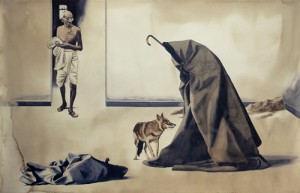Workstation 1: Self-organisation as Ethic
14th February 2012: Yongbong Culture Center, Chonnam National University, Gwangju; 10 am onwards
15th February 2012: Arthall, Artsonje Center, Seoul; 3 pm onwards
Speakers: Charles Esche, Gerardo Mosquera, Maria Hlavajova, WHW (Natasa IIic), Markus Miessen, Dmitry Vilensky (Chto delat), Minouk Lim, Nikolaus Hirsch, Taek-Gwang Lee, Bassam el Baroni, Alia Swastika, Heejin Kim.
The first Workstation will leak the Gwangju Biennale’s archive into the present, by retrieving the 2002 edition directed by Sung Wan Kyung and co-curated by Charles Esche and Hou Hanru. This edition eschewed conventional ideas of exhibition-making that privileged the artwork and the artistic genius above everything else, and replaced these with a wide range of artist initiatives and alternative art spaces from Asia and Europe.
Emerging from this act of re-visitation, we would like to re-examine different forms of artistic resistance premised on self-organisation, collectivity, and contingency. Through this act of ‘participatory recursion’, we will contextualise the reasons for the burgeoning of these alternative sites of art-making and communal self-making (premised on a critical and empathetic being-with-others) in the early 2000s. However, we shall also assess the validity, relevance and limitations of collective and collaborative forms of art-making today.
This Workstation proposes that the ‘act of self-organisation be seen as an ethic’, not merely as a format of collective action and revolution. In fact, such an ethic is present in the origin and genesis of the Gwangju Biennale – which resides in an act of heroic self-organisation, the May 18, 1980 uprising in Gwangju. This uprising heralded a political upheaval that culminated in the democratization of South Korea. It also prompted a cultural response that commemorates this spirit of dissensus, of a new and alternative beginning which every edition of the Gwangju Biennale incarnates.
That said, it must be clear that this Workstation will not merely romanticise the Gwangju uprising. Rather, it wishes to invoke the uprising as an example of a productive impetus to cultural production, arising from the ground of a specific politics, and phrased as an other to the existing international frameworks and mediascapes in which contemporary culture is produced. This is especially important in a historical situation like the present, when such readymade, media-manufactured phenomena as the Arab Spring are being presented as exemplars to be followed in all societies that suffer repression or oppression, and being celebrated as such by cultural practitioners. This is not to downplay the obvious popular struggles inscribed within the Arab Spring, but to point out that to be truly responsive to its circumstances, cultural production must retain its criticality towards all conditions of existence and representation, including those that seem to give it a measure of freedom. “Self-organisation, as a format, can be manipulated by larger political and economic systems. But self-organisation, as an ethic, continuously unknots and remakes all systems of control and domination”.


